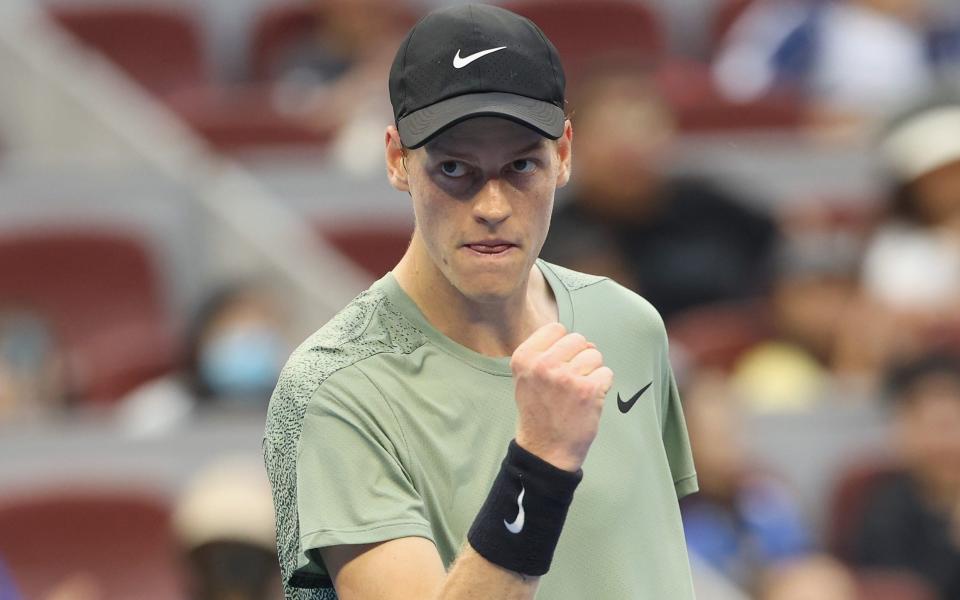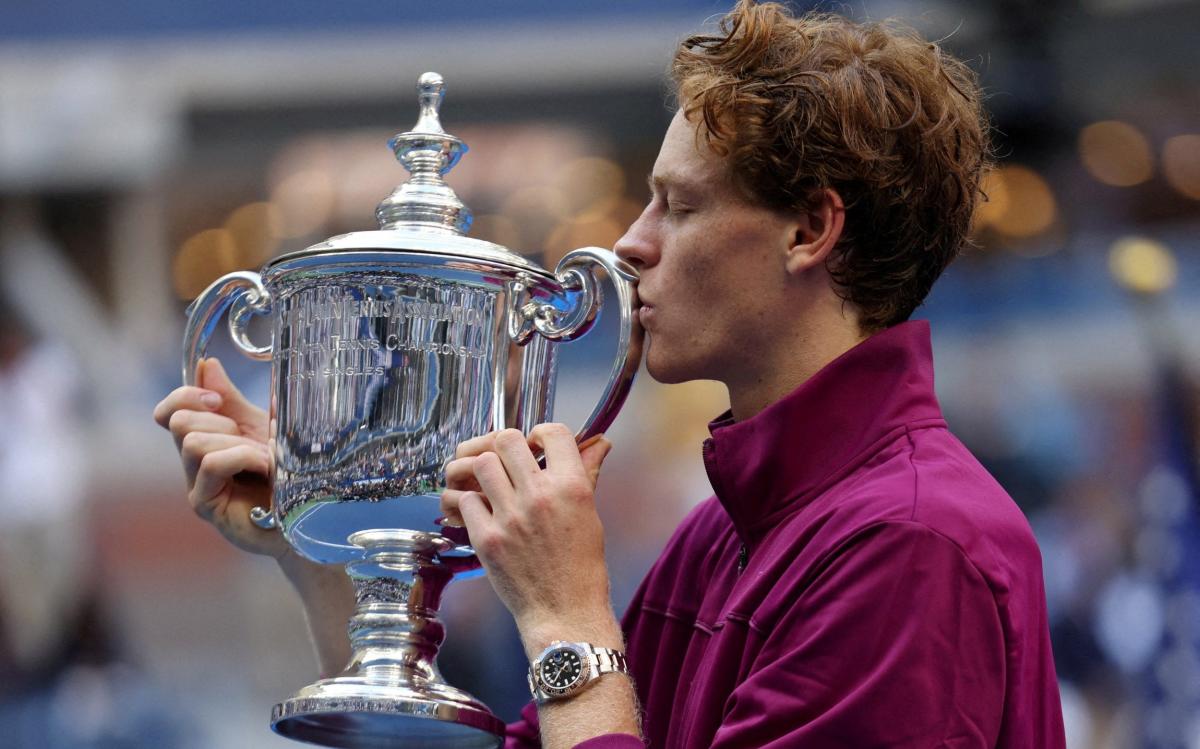Jannik Sinner will not be stripped of his US Open crown or any other title despite being plunged back into danger of a lengthy drugs ban by the World Anti-Doping Agency.
Sinner won the final grand slam of the year – defeating Britain’s Jack Draper in the semi-finals – days after an independent tribunal accepted that the world No 1 bore “no fault or negligence” over two positive tests caused by contamination from a massage by his physiotherapist.
Wada confirmed on Saturday that it had lodged an appeal against that ruling with sport’s highest court, the Court of Arbitration for Sport (Cas), and was pursuing a ban of “between one and two years”.
But it also said it was “not seeking a disqualification of any results” dating back to Sinner’s positive tests in March for the steroid clostebol, after which he was stripped only of his prize money and points earned at that month’s BNP Paribas Open in Indian Wells.
To compound matters, Telegraph Sport has been told it could be “months” before Cas hears any appeal, raising the prospect of Sinner defending his Australian Open title in January with the case still hanging over him. Sinner had managed to play at both the 2024 French Open and Wimbledon while fighting a provisional suspension and maintaining total secrecy around the case until the original verdict was reached.
Wada said: “It is Wada’s view that the finding of ‘no fault or negligence’ was not correct under the applicable rules. Wada is seeking a period of ineligibility of between one and two years. Wada is not seeking a disqualification of any results, save that which has already been imposed by the tribunal of first instance.”
Sinner ‘very disappointed and also surprised’
The original investigation into Sinner’s failed tests was carried out by the International Tennis Integrity Agency (ITIA), which said in response to Wada’s announcement: “Having reached an agreed set of facts following a thorough investigative process, the case was referred to a tribunal entirely independent of the ITIA to determine level of fault and therefore sanction because of the unique set of circumstances, and lack of comparable precedent. The process was run according to World Anti-Doping Code guidelines; however, the ITIA acknowledges and respects Wada’s right to appeal the independent tribunal’s decision in the Court of Arbitration for Sport.”
Wada announced it had lodged its appeal just minutes before Sinner was on court beating Roman Safiullin 3-6, 6-2, 6-3 to reach the quarter-finals of the China Open.


He said afterwards that he was “very disappointed and also surprised”, having learnt the news two days earlier, and pointed out “three hearings” into the case had come out “very positively for me”.
He added of Wada: “Maybe they just want to make sure that everything is in the right position.”
Later on Saturday, Sinner released a full statement which said: “I am disappointed to hear that Wada have chosen to appeal the result of my ITIA hearing after the independent judges had exonerated me and deemed me to be innocent.
“Over the past few months and throughout this process there have been three separate hearings, in each case confirming my innocence.
“Several months of interviews and investigations culminated in three senior judges scrutinising every detail through a formal hearing.
“They issued an in-depth judgement explaining why they determined me not at fault, with clear evidence provided of my cooperation throughout.
“On the back of such a robust process both the ITIA and the Italian anti-doping authority accepted it and waived their rights to appeal.
“I understand things need to be thoroughly investigated to maintain the integrity of the sport we all love. However, it is difficult to see what will be gained by asking a different set of three judges to look at the same facts and documentation all over again.
“This being said, I have nothing to hide, and as I have done throughout the summer, I will cooperate fully with the appeal process and provide whatever may be needed to prove my innocence once again.”
The China Open is Sinner’s first tournament since his US Open triumph earlier this month.
His victory at Flushing Meadow included a gruelling win over Draper, who was bidding to become the first Briton to reach a men’s singles final at a grand slam since Sir Andy Murray won Wimbledon eight years earlier.
Sinner sacked the physiotherapist, Giacomo Naldi, blamed for his failed tests and the fitness coach, Umberto Ferrara, who supplied the steroid, following the publication of a decision in his case shortly before the final major of the year in New York.
That was after an independent tribunal convened by Sports Resolutions accepted that Naldi had unwittingly exposed him to the banned substance by using a spray containing it to treat a cut finger and then massaging him.
Ferrara also admitted supplying the spray to Naldi, claiming he had warned him it contained such a substance – although the latter disputed this.
Sinner admitted just before the US Open that he had been “struggling a lot” after his coach, Darren Cahill, said that the doping case had made the Italian so ill that he was forced to miss the Olympics with tonsillitis.
The player, who won his first grand slam at the Australian Open in January, added of the four-month ordeal: “Of course, it’s not ideal before a grand slam. But, in my mind, I know that I haven’t done anything wrong.
“I had to play already months with this in my head, but just remembering myself that I haven’t done really anything wrong. I always will respect these rules of anti-doping. Just, obviously, a relief for myself having this result.”
Despite escaping a ban, Sinner was stripped of the 400 ranking points and £250,000 prize money he earned at March’s Masters 1000 tournament in Indian Wells, where he was beaten in the semi-finals by Carlos Alcaraz. But he feared it could have been much worse, with not all athletes found to have tested positive through contamination avoiding suspension.
“Of course I was worried, because it was the first time for me and hopefully the last time that I am in this situation, position,” Sinner said.
“A different part we have to see is the amount I had in my body, which is 0.000000001, so there are a lot of zeros before coming up with a one. So I was worried, of course, because I’m always the player who was working very, very carefully in this. I believe I’m a fair player on and off the court.”
Sinner’s drugs-ban reprieve nevertheless provoked a backlash from his fellow professionals, with Nick Kyrgios branding it “ridiculous”. Sinner suggested the case had exposed who his friends and enemies were, admitting he had to accept he was unable to control the impact of it on his reputation.
“Whoever knows me very well knows that I haven’t done and I would never do something that goes against the rules,” he said. “Here, I also know who is my friend and who is not my friend, no, because, my friends, they know that I would never do that.”

